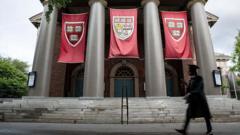The transfer includes 15 historic daguerreotypes, believed to feature enslaved individuals, resolving a long-standing dispute initiated by descendant Tamara Lanier. The images will now be displayed in a context that acknowledges their complicated history.
Harvard Transfers Historic Photos of Enslaved Individuals to South Carolina Museum

Harvard Transfers Historic Photos of Enslaved Individuals to South Carolina Museum
After a prolonged legal conflict, Harvard University has agreed to transfer early photographs of enslaved people to the International African American Museum, marking a significant moment in the reconciliation of historical injustices.
Harvard University has formally agreed to transfer a collection of historic photographs, considered to be some of the earliest depictions of enslaved African Americans, to the International African American Museum located in South Carolina. This decision concludes a lengthy legal confrontation led by Tamara Lanier, a Connecticut author, who claims to be a descendant of two individuals featured in the images.
The images, 15 daguerreotypes dating back to 1850, will now be preserved and displayed in the museum, where the depicted individuals were enslaved. Harvard expressed its longstanding intention for these significant images to be housed in a museum dedicated to African American history. Lanier expressed her overwhelming joy regarding the settlement, stating she felt "ecstatic" after the agreement was reached.
Originally discovered in 1976 in the storage of Harvard's Peabody Museum of Archaeology and Ethnology, the photographs capture individuals such as Alfred, Delia, Drana, and Renty. They were commissioned by renowned Harvard zoologist Louis Agassizam, who sought to prove racial superiority through debunked theories. The controversy surrounding these photographs has sparked broader discussions about how educational institutions in America reckon with their historical ties to slavery.
While Harvard did not disclose specific settlement details, a spokesperson indicated that the university has been eager to see the Zealy Daguerreotypes placed in a context that enhances public understanding and accessibility. However, the spokesperson also noted complexities arising from Lanier's lineage claim, stating that Harvard could not confirm her relationship to the individuals captured in the images.
Lanier first sued Harvard in 2019, arguing that the photographs were taken without consent and that the university was profiting from their reproduction. In 2022, the Massachusetts Supreme Judicial Court upheld an earlier decision dismissing her ownership claim, though allowed her to seek damages for emotional distress. The court remarked on Harvard's "complicity" in the emotional violations tied to the photographs’ creation.
Expressing satisfaction, Lanier emphasized the importance of transferring the images back to their historical roots in South Carolina, imagining the event as a "homecoming ceremony" for the enslaved individuals. The museum has pledged to present the photographs with a focus on truth and empathy, fostering discussions around the profound injustices of slavery and how those legacies resonate in contemporary society.




















